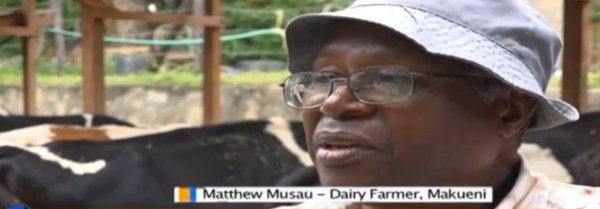After retiring from his graphic design job in Nairobi four years ago, Mathew Musau set upon his barren farm in Makueni County with enthusiasm that surprised his neighbours.
Just like his neighbours, Musau’s farm, tucked inside Iuwani village, had nothing to be proud of. Having been brutalised by the blazing sun for years, only a few strands of lifeless and weathered vegetation stood by.
The farmer, however, was driven by a strong will to establish a dairy farm on this desolate piece of land even as his neighbours laughed at his odd idea.
“My neighbours were awestruck and wondered how I could make that possible. But I had a plan,” recalls Musau, now a role model dairy farmer whose farm is a beehive of activity.
He started by sinking a borehole. With a reliable source of water, he started growing napier grass and other silage crops in his 50-acre farm in preparation for his venture.
Before long, he introduced some dairy cows in the farm. The journey started.
“I started with only six cows, all of them Friesian, which did extremely well. It’s not easy to run a dairy farm in Ukambani, but where there is a will there is a way. Many discouraged me but I carried on,” Musau says.
The farmer is now a proud owner of 30 dairy cows, mostly Friesian. Two years ago, he added two more breeds – Ayrshire and Guernsey.
Each cow produces an average 28 litres of milk a day. Musau has employed two farm hands to help him run the farm by feeding, milking and spraying the animals to prevent tick and other vector borne diseases.
The two workers must be up by 4am when the first round of milking is done.
The animals are then milked again at 12 noon and lastly at 8pm.
To maximise on profits, Musau gathered other dairy farmers from Kilala location to form Kilala Cooperative Society to help them sell their milk.
To curb milk wastage, the county government bought them cooling machines installed at Kikima in Mbooni sub-county. The county government is also establishing a mini dairy plant there.
“We sell 60 per cent of our milk there. A litre is sold for between Sh50 and Sh70 which is a good price,” says Musau.
A simple calculation shows that Musau is able to make between Sh40,000 and Sh50,000 a day, if all the milk is sold.
“This is a post retirement activity that keeps me busy and is giving me some good income. My passion is here,” says the farmer.
His plan is to start making yoghurt, cheese and other milk products.
Musau is particularly grateful to the county government for introducing Artificial Insemination (AI) services. The county has subsidised the services to only Sh300 from between Sh3,000 and Sh4,000 which Musau and other farmers were charged in the past.
“The (AI) service is fantastic. It’s cheap and the service providers are reliable. When a cow is on heat, I just call the service provider,” says Musau. The AI providers have trained farmers to detect when a cow is on heat.
The farmer says he gets livestock extension services from animal health assistants employed by the county government and deployed in the villages.
“The service providers routinely check on the pregnant animals until they deliver safely,” he says. He, however, cautions that the animals are heavy feeders, something that prospective farmers must put into consideration.
Dr David Musyoki, director at the county department of livestock and agriculture, says the idea behind subsidising the AI services is to enable farmers get the correct breed for maximum milk production.
“The service is now affordable to all farmers. We are building the potential of dairy farmers here by enabling them get heifers of correct breed,” says Dr Musyoki, adding that they are encouraged by the uptake of the service from farmers.









